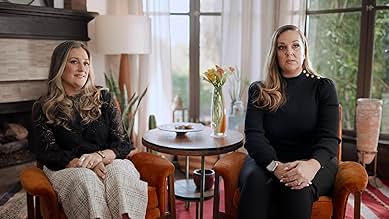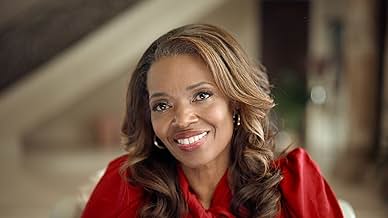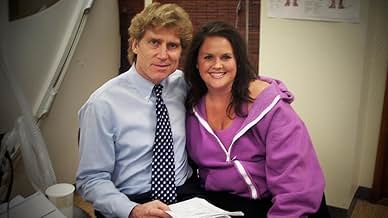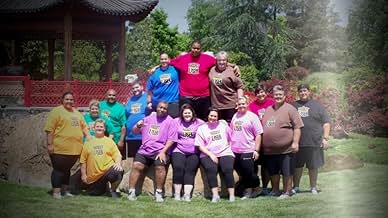अपनी भाषा में प्लॉट जोड़ेंTakes an inside look at the making of the hit reality TV competition, exploring the good, the bad, and the complicated.Takes an inside look at the making of the hit reality TV competition, exploring the good, the bad, and the complicated.Takes an inside look at the making of the hit reality TV competition, exploring the good, the bad, and the complicated.
एपिसोड ब्राउज़ करें
फ़ीचर्ड समीक्षाएं
While it was truly disheartening to see the producers (and some contestants) ignoring the physician's medical expertise, I felt like all of the contestants outside of season 1-2 had seen the show and knew what they were signing up for. The documentary also lacked a lot of important social context. At that time, bootcamp style workouts were all the rage. Crossfit was born out of that era. The doc really (and in my opinion unfairly) attacked the trainers for delivering the popular military-style workouts they were being paid to deliver at the time. They also left out that the show adapted over for time to address rising concerns like mental and emotional health. While we can see now how dangerous what they were doing was, I loved that show. It was inspirational to watch everyday folks achieve massive change and it proved that old fashioned diet and exercise can change your weight. If some folks cheated with pills, that is not the fault of the show. Bring back The Biggest Loser!
The biggest losers here, in my view, are the show's creators - profiting off televised humiliation and suffering while feigning selective memory. David Broome said, "It would be hard for me to comment on the sheriff investigation because I just don't remember it." His co-creator JD Roth strikes me as even more objectionable, with that ever-present smirk as he talks about masterminding the show the way a serial killer might reminisce about their victims.
This is a story of reckless TV executives chasing the next big thing, willing to go to any length to get it, yet unwilling to do the basic work of hiring the right professionals - dietitians, chefs, psychotherapists. They missed the chance to use this platform to teach a nation how to choose better food, cook easy healthy meals, work through unresolved emotional issues, and practice genuine self-care. As someone with a graduate degree in dietetics, I see obesity not only as a physical issue but also a deeply psychological one.
The documentary touched on manipulative and unethical challenges, the toll on contestants during and after filming, and the long-term damage, from slower metabolisms to chronic ailments. But it failed to widen the lens to the real backdrop: America's obesogenic environment, where unhealthy, ultra-processed foods are cheaper and more accessible than their healthier counterparts. These sugar- and fat-laden products are exactly what emotional eaters, or those chasing a dopamine hit, are drawn to.
I wish the documentary had gone deeper into how each former contestant ended up at their starting weight and what was going on in their inner world. I suspect the common thread would have been self-loathing and negative self-talk. Tracey Yukich put it best: "You need to cheer for yourself... The show didn't change my life. I changed my life. I did that."
This is a story of reckless TV executives chasing the next big thing, willing to go to any length to get it, yet unwilling to do the basic work of hiring the right professionals - dietitians, chefs, psychotherapists. They missed the chance to use this platform to teach a nation how to choose better food, cook easy healthy meals, work through unresolved emotional issues, and practice genuine self-care. As someone with a graduate degree in dietetics, I see obesity not only as a physical issue but also a deeply psychological one.
The documentary touched on manipulative and unethical challenges, the toll on contestants during and after filming, and the long-term damage, from slower metabolisms to chronic ailments. But it failed to widen the lens to the real backdrop: America's obesogenic environment, where unhealthy, ultra-processed foods are cheaper and more accessible than their healthier counterparts. These sugar- and fat-laden products are exactly what emotional eaters, or those chasing a dopamine hit, are drawn to.
I wish the documentary had gone deeper into how each former contestant ended up at their starting weight and what was going on in their inner world. I suspect the common thread would have been self-loathing and negative self-talk. Tracey Yukich put it best: "You need to cheer for yourself... The show didn't change my life. I changed my life. I did that."
Honestly it was insufferable seeing Bob Harper and the producers acting as if they did mostly good things and not take any accountability for anything they made these poor people go through.
Anyone trying to lose weight should always exercise at their own pace and obviously should not be made to work out until they throw up and the fact that anyone thought this was okay is wild to me but maybe not too surprising as society does seem to hate fat people and that fact that a show like "The Biggest Loser" was ever a thing proves it.
I wish nothing but the worst for not only Bob Harper and the producers but everyone blaming the contestant in the reviews, still i'm glad that this documentary exists and i hope it opened some people' eyes if they didn't know about this already.
Anyone trying to lose weight should always exercise at their own pace and obviously should not be made to work out until they throw up and the fact that anyone thought this was okay is wild to me but maybe not too surprising as society does seem to hate fat people and that fact that a show like "The Biggest Loser" was ever a thing proves it.
I wish nothing but the worst for not only Bob Harper and the producers but everyone blaming the contestant in the reviews, still i'm glad that this documentary exists and i hope it opened some people' eyes if they didn't know about this already.
I watched The Biggest Loser with my wife at the time. Good grief, anyone who had watched the first season knew EXACTLY what they were getting themselves into. They'd seen Bob and Jillian get up in the faces of the contestants, and raise their voices as part of the motivation. ANYONE who was involved in team sports in high school has endured far worse than that. Joelle seemed to lock herself into a power struggle with her coach. She deliberately held back during training sessions as a way of holding onto that little bit of control. Her negative experiences on TBL seem to be rooted in the fact that her personality was completely unsuited for the show. Crying that there isn't "aftercare" for contestants after the show is the most entitled nonsense. Grow up. The program helped you lose a large amount of weight, it's on you to change your life if you want to keep it off. Caffeine as a scandal? C'mon.
It was a fascinating watch, but I'm not sure it really went anywhere. There was no solid finding or conclusion-just a range of opinions. So, not a great ending.
For me, however, there were some takeaways:
1. The treatment of the woman with rhabdomyolysis was appalling. If her allegations are true, she is owed at least an apology from the trainers and producers-possibly more. It's a reminder that very few people truly understand rhabdo.
2. The Biggest Loser was always about entertainment and money. It was a mistake to think otherwise.
3. The doctor seemed like a good guy. I only wish he had been more outspoken.
4. Weight loss isn't achieved by exercise-it's about calorie deficit. As Bob acknowledged, the exercise was largely for show. At the same time, too steep a calorie deficit is dangerous and unhealthy in the long term. The trainers should have known better.
5. There was definitely some fat-shaming. And some of what the trainers did crossed the line.
For me, however, there were some takeaways:
1. The treatment of the woman with rhabdomyolysis was appalling. If her allegations are true, she is owed at least an apology from the trainers and producers-possibly more. It's a reminder that very few people truly understand rhabdo.
2. The Biggest Loser was always about entertainment and money. It was a mistake to think otherwise.
3. The doctor seemed like a good guy. I only wish he had been more outspoken.
4. Weight loss isn't achieved by exercise-it's about calorie deficit. As Bob acknowledged, the exercise was largely for show. At the same time, too steep a calorie deficit is dangerous and unhealthy in the long term. The trainers should have known better.
5. There was definitely some fat-shaming. And some of what the trainers did crossed the line.
टॉप पसंद
रेटिंग देने के लिए साइन-इन करें और वैयक्तिकृत सुझावों के लिए वॉचलिस्ट करें
विवरण
- चलने की अवधि
- 2 घं 4 मि(124 min)
- रंग
इस पेज में योगदान दें
किसी बदलाव का सुझाव दें या अनुपलब्ध कॉन्टेंट जोड़ें

































